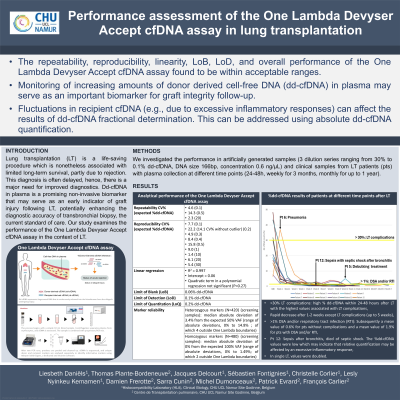(P605) Performance assessment of the One Lambda Devyser Accept cfDNA assay in lung transplantation
Location: Platinum Ballroom

Poster Presenter(s)
Aim: Lung transplantation (LT) is a life-saving procedure which is nonetheless associated with limited long-term survival, partly due to rejection. This diagnosis is often delayed, hence, there is a major need for improved diagnostics. The biomarker donor-derived cell free DNA (ddcfDNA) in plasma seems to be an early sign of injury after LT that could improve the performance of transbronchial biopsy, the current gold standard. Our study examines the performance of the OL Devyser Accept cfDNA assay.
Method: We investigated the performance of the assay in artificially generated samples as well as in clinical samples from LT patients with plasma collection at different time points after LT (24-48h, every week for 3 months).
Results: Repeatability (3 mixtures (0.1%,0.5%,20%;0.6ng/µL) in a single run) and reproducibility (3 mixtures (0.1%,0.2%,0.3%,0.4%,0.5%,1%,10%,20%,30%;0.6ng/µL) in 3 separate runs) was <16% (1 outlier for 0.2%, resulted in a CV of 22%). Linear regression (0%-30%;0.6ng/µL) resulted in an intercept of 0.06, R2 was 0.997 and the quadratic term in a polynomial regression was not significant (p=0.27). LoB was based on 418 noninformative homozygous markers (in vitro mixtures and clinical samples). 95th percentile was 0.06%, LoD was 0.1% (LoB+1.65*SD0.1%) and the LoQ was 0.2% (CV=22%, Bias=13%). All measurements passed sample OL QC metrics. Analysis of heterozygous screening markers (N=420) revealed a median absolute deviation of 3.4% (range 0%-14.8%; of which 4 outside OL boundaries) and for homozygous markers (N=480) a median absolute deviation of 0% (range 0%-1.49%; of which 2 outside OL boundaries). A clinical evaluation is ongoing in a prospective cohort study to investigate the kinetics of ddcfDNA in patients after LT. Our preliminary results revealed a high %cfDNA (No complications, N=4, mean=15.2%; PGD, N=1, 30.5%; ECMO, N=1, 7.6%) within 24-48 hours after LT. We observed a rapid decrease after 1-2 weeks with a mean of 1.8%, except for 1 patient who presented with pneumonia (37.1%). Subsequently, we observed a mean value of 0.9%, all these patients presented RTIs. 2 patients had DSA and the mean value was 2.6%. In SLT, the values doubled.
Conclusion: The repeatability, reproducibility, linearity, LoB, LoD, LoQ and the overall performance of the OL Devyser cfDNA assay were acceptable. We also report preliminary clinical validity results of the assay for LT. Additional data are collected.
Method: We investigated the performance of the assay in artificially generated samples as well as in clinical samples from LT patients with plasma collection at different time points after LT (24-48h, every week for 3 months).
Results: Repeatability (3 mixtures (0.1%,0.5%,20%;0.6ng/µL) in a single run) and reproducibility (3 mixtures (0.1%,0.2%,0.3%,0.4%,0.5%,1%,10%,20%,30%;0.6ng/µL) in 3 separate runs) was <16% (1 outlier for 0.2%, resulted in a CV of 22%). Linear regression (0%-30%;0.6ng/µL) resulted in an intercept of 0.06, R2 was 0.997 and the quadratic term in a polynomial regression was not significant (p=0.27). LoB was based on 418 noninformative homozygous markers (in vitro mixtures and clinical samples). 95th percentile was 0.06%, LoD was 0.1% (LoB+1.65*SD0.1%) and the LoQ was 0.2% (CV=22%, Bias=13%). All measurements passed sample OL QC metrics. Analysis of heterozygous screening markers (N=420) revealed a median absolute deviation of 3.4% (range 0%-14.8%; of which 4 outside OL boundaries) and for homozygous markers (N=480) a median absolute deviation of 0% (range 0%-1.49%; of which 2 outside OL boundaries). A clinical evaluation is ongoing in a prospective cohort study to investigate the kinetics of ddcfDNA in patients after LT. Our preliminary results revealed a high %cfDNA (No complications, N=4, mean=15.2%; PGD, N=1, 30.5%; ECMO, N=1, 7.6%) within 24-48 hours after LT. We observed a rapid decrease after 1-2 weeks with a mean of 1.8%, except for 1 patient who presented with pneumonia (37.1%). Subsequently, we observed a mean value of 0.9%, all these patients presented RTIs. 2 patients had DSA and the mean value was 2.6%. In SLT, the values doubled.
Conclusion: The repeatability, reproducibility, linearity, LoB, LoD, LoQ and the overall performance of the OL Devyser cfDNA assay were acceptable. We also report preliminary clinical validity results of the assay for LT. Additional data are collected.

.jpg)